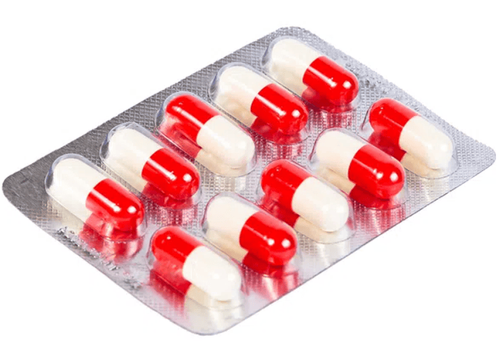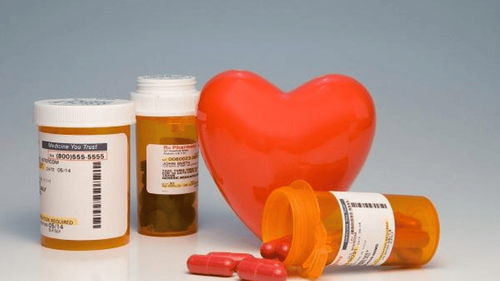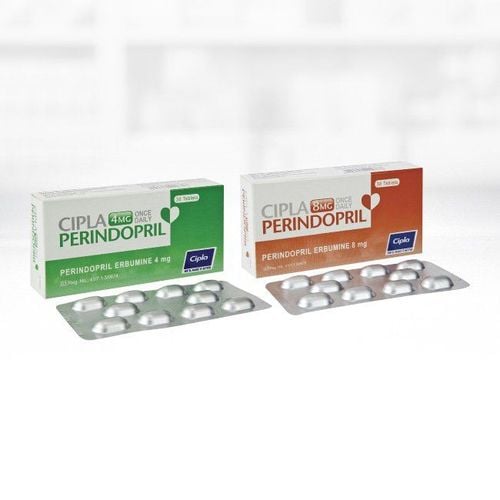This is an automatically translated article.
Amcardia drug belongs to the group of cardiovascular drugs used in the treatment of hypertension, myocardial ischemia with stable angina. So what does amcardia do?
1. What does amcardia do?
Amcardia, also known as amlodipine, is a dihydropyridine calcium channel blocker. Amcardia belongs to a group of cardiovascular drugs that are effective in the treatment of hypertension and myocardial ischemia associated with stable angina pectoris. The active ingredient amlodipine selectively inhibits the influx of calcium ions into the cell membrane, which is more selective for vascular smooth muscle than cardiac muscle tissue. This property leads to vasodilation and hypotension. The reduction in myocardial oxygen demand associated with coronary vasodilation confers a beneficial effect on myocardial ischemia. In particular, amcardia has a slow and prolonged effect, so lowering blood pressure is not accompanied by reflex tachycardia but does not significantly affect sinus node function and cardiac conduction. Amlodipine is a dihydropyridine derivative that blocks the influx of calcium across the cell membrane, blocking voltage-dependent L-type calcium channels, affecting vascular smooth muscle and the heart. Therefore, amcardia has an antihypertensive effect by directly relaxing peripheral arterial smooth muscle and has less effect on myocardial calcium channels, so it does not lead to impaired atrioventricular conduction in the heart. It also has no effect on myocardial contractility. Besides, amlodipine also has a good effect on reducing renal vascular resistance, increasing renal blood flow and improving renal function. Therefore, the drug amcardia can be used in the treatment of patients with compensated heart failure.Besides the above uses, amcardia medicine can also be used to treat a number of other conditions that are not listed above. Therefore, before taking the drug, consult your doctor for advice and effective use of the drug.
2. Indications and contraindications
2.1 Indications for amcardia use Indications to use amcardia include:
High blood pressure Stable chronic angina spasmodic angina 2.2 Contraindication to amcardia use Contraindication to use Use of amcardia for patients with a history of hypersensitivity to drugs containing dihydropyridine
3. Usage and dosage of amcardia
Amcardia is made in tablet form so it can be taken on an empty stomach or on an empty stomach. You should take the medicine with a full glass of water to avoid stomach irritation. Dosage of amcardia drug will depend on the disease status and age of the patient such as:
For adults treating high blood pressure, the dose is 5mg/day, if there is no response to treatment after 2 weeks, the dose may be 5mg/day. increase dose to 10 mg/day. Treatment of angina pectoris takes a dose of 5-10mg, a single dose in a day. For the elderly and impaired liver function, a dose of 2.5 mg/day may be initiated and dose adjustment is required. Use amcardia regularly to get the most benefit from it. To take your medicine safely, take amcardia exactly as directed by your doctor, and do not use it more often, less often, or for longer than prescribed. Absolutely do not abuse the drug for too long for a long time or arbitrarily increase the dose of the drug. Because this not only makes the condition worse, but also increases the risk of unwanted effects.
4. Undesirable effects when using amcardia drugs
Some unwanted effects that may occur when using amcardia include:
Edema and flushing due to vasodilation, usually mild or moderate, Cramping, Frequent urination, Nocturia Cough, Impotence, Asthma Nosebleed Conjunctivitis Before prescribing medication, doctors always weigh the benefits and effects of amcardia more than the risk of side effects. However, in some cases, when taking amcardia, unwanted effects may still occur. Therefore, when there are unusual signs after taking the drug, especially when a severe allergic reaction occurs with accompanying signs such as difficulty breathing, severe dizziness, swelling, rash or itching of the face, throat, tongue,... In this case, the patient should immediately notify the medical staff for immediate intervention.
5. Some notes when using amcardia drugs
Some notes when using amcardia medicine include:
Tell your doctor about a history of allergy to amcardia or any other allergies. amcardia may contain inactive ingredients and could cause an allergic reaction or other serious problems. Report any medications you are taking including prescription and nonprescription drugs, herbs and supplements, foods, dyes or preservatives. Amcardia should be used with caution in pregnant and lactating women. Because at present, there are still not enough studies and verifications on the safety and effectiveness of the drug for pregnant and lactating women. Calcium channel blockers can inhibit premature uterine contractions. However, the drug amcardia does not have an adverse effect on the labor process, so the risk of hypoxia to the fetus must be taken into account if it causes hypotension in the mother, because there is a risk of reducing placental perfusion. In addition, according to an animal experiment, calcium channel blockers can be teratogenic in the form of skeletal malformations. Therefore, avoid using amcardia for pregnant women especially during the first 3 months of pregnancy. For elderly patients and patients with impaired liver function, the half-life is increased, it is necessary to reduce the dose. Use with caution in patients with heart failure. If you forget to take a dose, take the missed dose as soon as possible. However, if it is almost time for the next dose, skip the missed dose and continue taking the medicine as scheduled. Do not arbitrarily use the drug twice the dose more than the treatment regimen. An overdose of amcardia can cause serious symptoms, especially a drop in blood pressure. Gastric lavage is required as well as treatment of symptoms such as increased blood pressure.
6. Drug interactions
Drug interactions may reduce the effectiveness of amcardia, or increase the effect of unwanted effects. Tell your doctor about all other medicines you are taking including vitamins, over-the-counter medicines, prescription drugs, and herbal products. Do not stop, start, or change the dose of any medicine without your doctor's consent without your doctor's consent.
7. How to store amcardia?
Store amcardia at a temperature below 40 degrees Celsius and preferably between 15-30 degrees Celsius in sealed packaging, protected from light and away from moisture. Do not store amcardia in a humid place or in the freezer. Different medicines will have different storage methods, so read the amcardia storage instructions carefully on the package, or ask your pharmacist. Keep amcardia medicine out of the reach of children and family pets. When the medicine has been damaged, it cannot be used anymore or has expired, please dispose of the medicine according to the correct procedure. Do not arbitrarily dispose of amcardia into an environment such as a plumbing or toilet unless requested to do so. Consult with your environmental waste company or pharmacist on how to safely dispose of amcardia to help protect the environment.
In summary, the drug amcardia belongs to the group of cardiovascular drugs that are effective in the treatment of hypertension, myocardial ischemia with stable angina. However, amcardia can cause some unwanted effects and drug interactions, so tell your doctor what medications you are taking to reduce the risk of side effects and increase effectiveness. for the treatment.
Follow Vinmec International General Hospital website to get more health, nutrition and beauty information to protect the health of yourself and your loved ones in your family.
Please dial HOTLINE for more information or register for an appointment HERE. Download MyVinmec app to make appointments faster and to manage your bookings easily.













